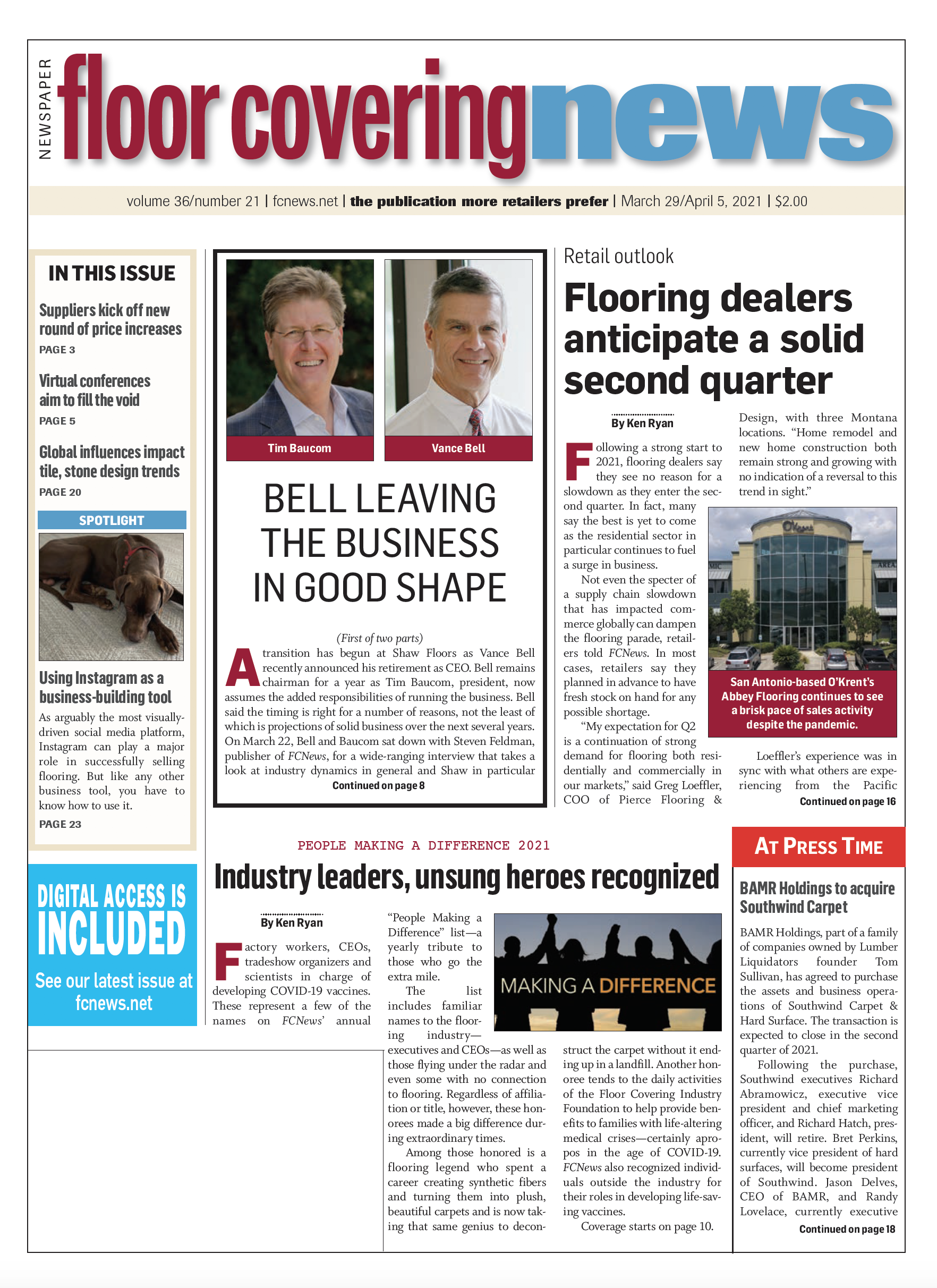Following is the fourth edition of the Real Wood Coalition editorial coverage, which can also be seen in the March 29/April 5 print edition of FCNews.
These features include educational insights, new and staple hardwood products and a spotlight featuring one of the Coalition’s members. A new edition of RWC coverage will be available in every print issue of FCNews throughout the year.
DID YOU KNOW
When educating consumers on wood flooring, it’s best to keep things simple
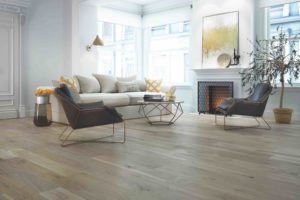
The best approach to guiding consumers through the product selection process, experts say, is to avoid overwhelming them with technical terms. While a basic explanation of the various formats, constructions and styles will be required to determine which product best suits the customer’s needs, the key to success lies in speaking with her in terms she can relate to and understand.
For instance, one of the most frequently asked questions is, “What’s best—a prefinished floor or unfinished?” While a hardwood floor can be purchased unfinished and finished on site, many consumers prefer the convenience of getting a prefinished hardwood floor that’s ready to install right out of the box. But even among prefinished floors there are other factors to consider, namely the number of coats applied to the surface of the product as well as the properties and advantages that each coat brings to the final product.
“The application of successive and distinct coats makes it possible to combine flexibility, durability, resistance to friction, adhesion to the wood, gloss and, of course, the final visual aspect of the floor,” Wade Bondrowski, director of sales, U.S., Mercier Wood Flooring, explained.
There are other benefits to prefinished floors. Factory finished floors are often recommended for people with allergy issues. Since these finishes are solvent-free, the floors have very few emissions, which makes them hypoallergenic and, therefore, more desirable.
Other questions consumers might have may pertain to the difference between wood look- alike products vs. the real thing. This can be especially tricky, proponents say, when comparing genuine wood floors to products that mimic real wood but tout enhanced performance attributes. In these situations, experts say the most effective approach is to accentuate wood’s natural attributes.
“Today’s wood floors provide real solutions to everyday situations,” said Paul Stringer, vice president of sales and marketing, Somerset. “With real wood, customers get the beauty, texture, prestige and the strength of a natural product vs. a plastic floor. Today’s hardwood flooring products offer more features and benefits consumers desire, including waterproof attributes.”
SELLING TIPS
Five tips on trading up to real wood
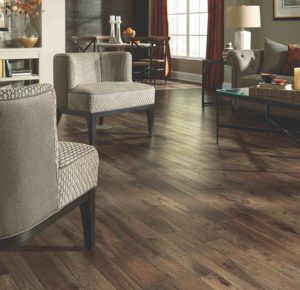 With the slew of wood look-alikes and other alternatives available on the market today, helping the consumer narrow down her selection is no easy task. Following are some tips RSAs can employ to help trade consumers back up to real wood flooring.
With the slew of wood look-alikes and other alternatives available on the market today, helping the consumer narrow down her selection is no easy task. Following are some tips RSAs can employ to help trade consumers back up to real wood flooring.
Tip #1: Emphasize the difference between flooring types. The flood of wood look-alike products—led by LVT, WPC, SPC and other rigid core options—has created a lot of confusion about what is and what is not a real wood floor. Hence the importance of educating not only the consumer but also retail salespeople about the benefits real wood offers over competing categories.
“We encourage the entire wood flooring industry to utilize the preference they have with homeowners and to work together so when consumers ask for wood floors, the supply chain is selling real wood instead of a substitute product,” said Michael Martin, president and CEO of the National Wood Flooring Association.
Tip #2: Promote hardwood’s attributes. Research shows 52% of homes in the U.S. have wood floors somewhere in the house, and nearly two-thirds of consumers agree wood adds the most value to a home compared to other options.
Tip #3: Wood flooring is sustainable. Many non-wood alternatives tout enhanced resistance to moisture and water damage due to the waterproof construction of the core material. On the flip side, many of these products contain plastic or materials derived from petroleum—none of which are naturally biodegradable.
Tip #4: Selling wood provides greater profit margins. While hardwood flooring has lost market share to other hard surface categories, there is still money to be made selling real hardwood. “Wood offers better margins for retailers, bigger paychecks for RSAs and greater satisfaction for consumers,” said Chris King, vice president, sales, AHF Products.
Tip #5: Wood provides greater value over the long haul. The No. 1 selling point for the consumer who is interested in purchasing a real wood floor for her home is return on investment. “For consumers who want to add value to their home, hardwood floor remains their preferred choice,” said Pierre Thabet, president and CEO of Boa-Franc, maker of the Mirage brand.
TRIED AND TRUE
Brazilian chestnut from Indusparquet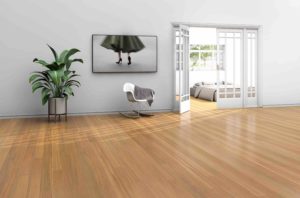
Sucupira (Brazilian Chestnut) is one of the world’s most durable hardwood species, boasting a Janka rating of 3500. That makes it twice as strong as American red oak, which translates into a long-lasting product for the consumer. The popular species also features natural color variations and grain patterns that are eye catching but not overwhelming to the overall design of the room. What’s more, Brazilian Chestnut maintains its natural beauty through years of wear and tear.
NEW AND NOTABLE
Hartco HydroBlok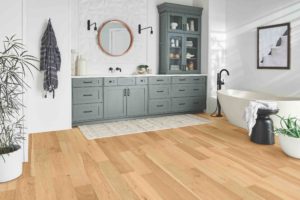
AHF Products unveiled Hartco HydroBlok, a 100% waterproof genuine hardwood flooring. Made for everyday life, HydroBlok is a waterproof white oak and hickory engineered hardwood collection infused with proprietary technology that provides top-down moisture protection for up to 36 hours.
Mullican: Hardwood flooring stewards
Mullican Hardwood Flooring is a leading American manufacturer of premium hardwood flooring. The company is committed to providing the best quality hardwood flooring to its partners and customers, creating a product that provides a safe, beautiful and original living space for families and their loved ones for generations while adding value to the home. The Mullican team is consistently developing new products and styles to match the demands and expectations of their partners and customers.
Mullican sources hardwoods exclusively from the Appalachian Mountains. This helps the company craft beautiful flooring products with consistent grain symmetry and sought-after patterns that customers desire. Real hardwood flooring, both solid and engineered, remains in high demand among homeowners, architects and interior designers alike. To that end, Mullican offers end users a wide variety of options to match virtually any décor. Furthermore, customers desire flooring products that are not only responsibly sourced but also safe for their families, employees and guests. Mullican is Responsible Forestry Certified and verified by the U.S. Renewing forest label. What’s more, all Mullican prefinished flooring is FloorScore certified, the leading certification standard for air quality.

